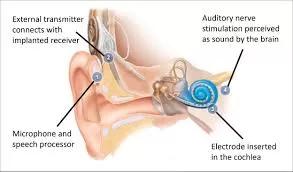
A team of researchers led by Mara Eugenia Gomez-Casati from the Institute of Pharmacology at the School of Medicine, University of Buenos Aires-CONICET, along with Mauricio Martin from the Institute of Medical Research Mercedes and Martin Ferreyra from the National University of Córdoba in Argentina, have uncovered that the decline of cholesterol levels in the inner ear is linked to age-related hearing loss.
Their experiments, published in the open-access journal PLOS Biology, have demonstrated that phytosterol supplements have the potential to substitute for the absent cholesterol and prevent sensory impairment in mice.
The inner ear contains sensory cells known as outer hair cells (OHCs), which contribute to sound amplification by altering their length. As individuals age, these cells lose their capacity to stretch in response to sound, which hinders sound amplification and contributes to age-related hearing loss.
Given that cholesterol plays a crucial role in the stretching response and that age-related decline in brain cholesterol levels has been observed, researchers formulated a hypothesis that a decline in cholesterol within OHCs could be connected to hearing loss. To test this hypothesis, they conducted experiments using mice.
In their study, the researchers took several steps to investigate the relationship between cholesterol levels and age-related hearing loss:
- Measurement of CYP46A1: The researchers assessed the levels of the enzyme CYP46A1 in the OHCs of the inner ear. CYP46A1 is responsible for breaking down and recycling cholesterol. They discovered that older mice had higher levels of CYP46A1 in their inner ears compared to younger mice. This increase in the enzyme corresponded with lower cholesterol levels in the inner ears of older mice.
- Cause and Effect Demonstration: To establish a causal relationship, the researchers induced hearing loss in young mice by using a drug to over-activate CYP46A1. This resulted in abnormal output from the inner ear cells, indicating hearing loss.
- Counteracting the Effect: The researchers then examined whether increasing cholesterol levels in the brain could counteract the effects of the drug-induced hearing loss.
 These steps collectively helped the researchers understand the role of cholesterol and its related enzyme in age-related hearing loss and how manipulating these factors could impact hearing loss in mice.
These steps collectively helped the researchers understand the role of cholesterol and its related enzyme in age-related hearing loss and how manipulating these factors could impact hearing loss in mice.
Since cholesterol itself cannot naturally penetrate the brain from the bloodstream, the researchers turned to plant-based cholesterol-like compounds known as phytosterols, which have the ability to do so. They administered both the CYP46A1-activating drug and dietary phytosterols to young mice, resulting in improved function of the outer hair cells (OHCs) responsible for hearing.
The presence of phytosterols in readily available over-the-counter supplements suggests a potential convenient method for addressing age-related hearing loss. However, before definitive conclusions can be drawn, further testing is necessary. This involves evaluating the impact of phytosterols on hearing loss in older mouse models and eventually in humans.
The researchers underscore the significance of their findings, stating that their work demonstrates the loss of cholesterol from inner ear sensory cells due to aging. Additionally, they replicate this loss and the resultant impairment of OHC function using a retroviral treatment commonly used for HIV/AIDS patients. The study’s results offer a promising proof-of-concept for using phytosterol supplementation as a potential strategy for preventing or treating hearing loss.











